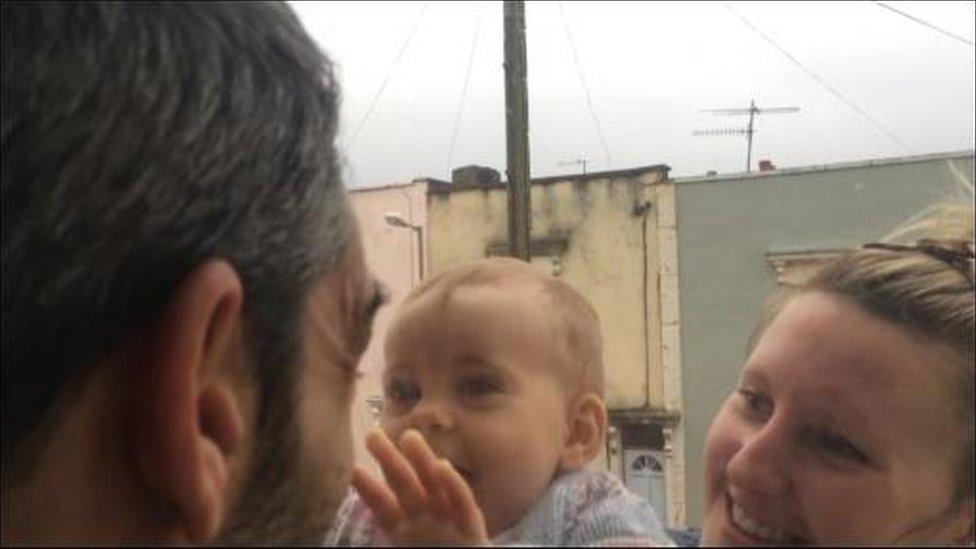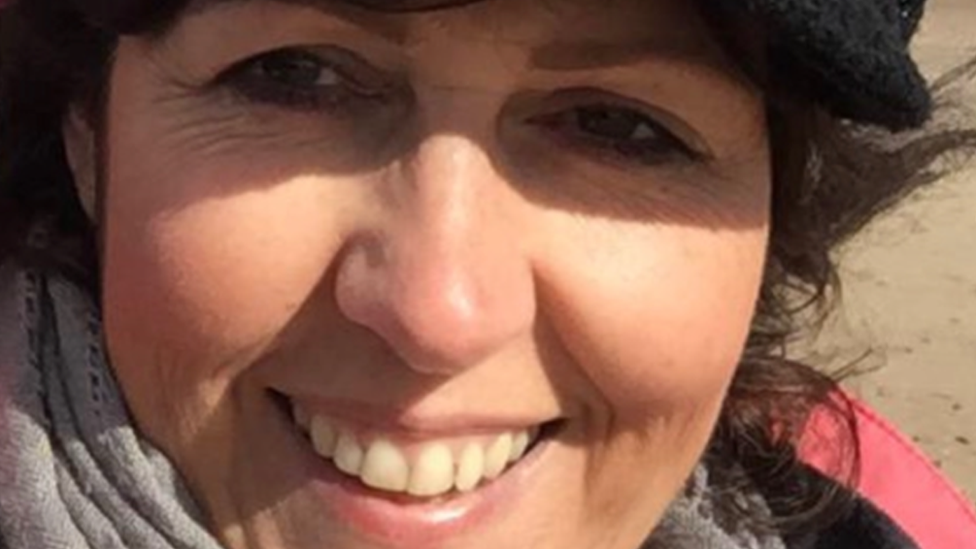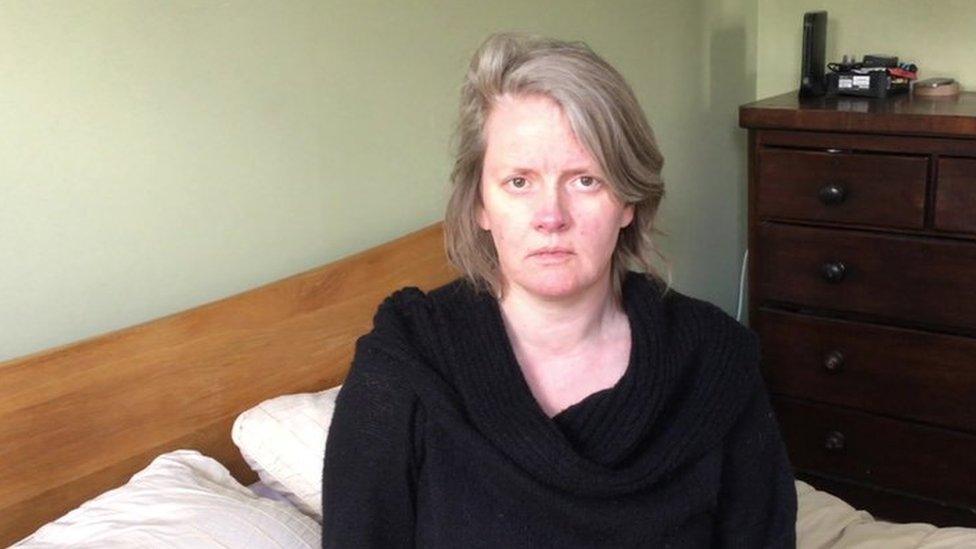The patients who just can't shake off Covid-19
- Published

David interacts with his family through a window
David Harris's world has shrunk to the size of his front room.
Seven weeks ago he developed Covid-19 symptoms that he describes as being like a bad flu.
That was when the freelance architect, 42, first began to isolate himself at the home in Bristol he shares with his wife and baby daughter.
After a week or so he started to feel better, but two weeks later his symptoms returned, much to his surprise.
"It's been a bit of a mini-saga of a recurring wave of symptoms which I wasn't expecting at all," he said.
"The second wave was much worse - the same flu symptoms, but also with shortness of breath, and that's why I was confident it was coronavirus.
"Then I had two weeks where I thought I was getting better, I was just very tired.
"And then on week seven, I relapsed again and had my third wave, luckily much milder but still significant."
Coronavirus: How long does it take to recover?
Inside an ICU fighting Covid-19
Working on the basis it was better to be safe than sorry, David continued to self-isolate, changing into clean clothes on the rare occasions he left the front room to visit the bathroom, and eating and sleeping alone.
His wife would bring their 10-month-old daughter Millie to the window of the front room so David could see her through the glass.
The illness left David exhausted and uncertain what was going to happen next.
"Probably one of the most stressful things is trying to work out at what point you ask for help.
"You don't want to pester the NHS, because there are obviously people in much worse situations than me.
"But certainly, at my weakest moment I didn't want to fall into the trap of not asking for help and then something bad happening because you didn't ask for help.
"When I first relapsed, when I first got worse, it's quite a scary experience because you don't know if that means you're going down, down, down.
"So it is quite scary to get worse when you thought you were getting better."
'It's lingering on'
Allison Needham is still experiencing symptoms a month after her 'recovery' from Covid-19.
"The other night I constantly woke up, gasping for breath - they call it being 'air hungry'.
"When people say shortness of breath, it's more like you've forgotten to breathe and you have to take huge breath, literally a huge gasp.
"It adds to the exhaustion and for me, that's the worst thing."
Her problems started with a cough over the Easter weekend which she initially thought was hay fever.

But within a few days she was really ill - back and muscle pain, tender skin, severe headaches, chills.
Allison ,56, has no underlying health conditions.
She works for the NHS in Sheffield and so was able to get a test that confirmed she had COVID-19.
She assumed she'd be better by now, but the illness lingers on.
"If you feel a bit better, as soon as you start to do something it knocks you off your feet again.
"I get a surging, burning feeling in my chest, which can be a bit scary, but I don't panic anymore."
Allison feels she - and thousands like her - are not getting the help they need.
A Facebook group has linked her with many others going through a similar experience - people who feel their condition is being overlooked as they struggle to regain their health.
"I am worried about getting back to work and how long this could go on for.
"I do feel people should be re-tested, even if it's just to offer reassurance that you're no longer contagious as I feel like I still have it - the symptoms are the same."
Extreme agony
Felicity, 49, from London, is six weeks into her recovery after first falling ill with Covid-type symptoms.
But like David, her experience has been far from smooth.
"I think the hardest part was having gone through the first 10 days of being very sick and thinking I was getting better, things then getting much, much worse again.

Felicity has had symptoms for six weeks
"So it was actually in the fifth week of being ill that my partner had to call A&E because I was experiencing such horrific abdominal pains that I was just calling out in just extreme agony.
"It's so difficult to know, is that the work of the virus? Is it the immune system's response? Is it ongoing inflammation?
"I had no problems in my stomach before falling sick, but week five was just horrendous."
Neither Felicity nor David has been tested for Covid-19, but both were told by doctors they probably had the virus.
They have also been assured they are no longer infectious.
But Felicity struggled to shake off her symptoms and the weeks of illness have taken their toll.
"I spend a huge amount of time in bed trying to recover.
"This entire experience, of being sick and trying to recover, has been mentally overwhelming."

A SIMPLE GUIDE: How do I protect myself?
AVOIDING CONTACT: The rules on self-isolation and exercise
PUBLIC TRANSPORT: Is it safe to travel?

Most recover quickly
Part of the problem is that so much about the coronavirus is unknown, including why some people experience relatively mild symptoms lasting a few days, while other perfectly healthy people are left struggling for weeks.
Dr Philip Gothard, a consultant physician at London's Hospital for Tropical Diseases, says the vast majority of patients make a full and fairly rapid recovery.
"Some will have a persisting cough and we're beginning to see patients who've got profound fatigue and exhaustion that goes on perhaps three, four, five or six weeks.
"It's very distressing if you're an otherwise young healthy person, it's something you're not used to.
"And so it comes as a shock that recovery is slow and stuttering.
"But in many patients with other diseases who are recovering from an acute illness you do tend to see this kind of waxing and waning effect as you are slowly getting better, and you have good days and bad days."
Tim Spector, professor of genetic epidemiology at King's College London, says data emerging from the Covid Symptom Study app shows that, on average, it takes people 12 days to start slowly recovering.
"We are also seeing a significant number of people reporting symptoms that can go on much longer than this, in some cases for 30 days or more.
"As we collect more data and continue to use machine-learning and artificial intelligence, we will soon be able to identify which combination of symptoms and risk factors make a person more or less likely to suffer from these longer terms symptoms."
David and Felicity both hope they are now finally recovering and can start to return to normal life.
But Covid-19, an illness that is still only a few months old, continues to spring surprises on us, and none of them welcome.